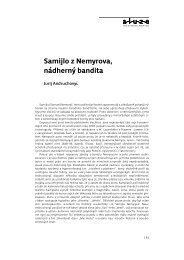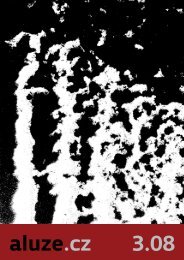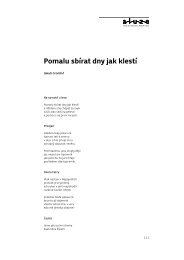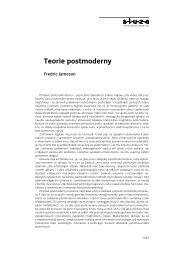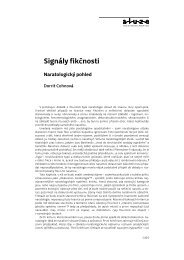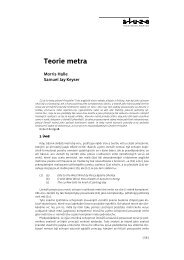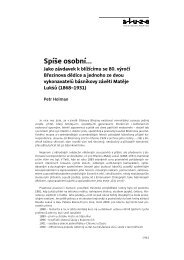[studie] ALUZE 2/2009 – Revue pro literaturu, filozofii a jiné dii „Theological Foundations of Kepler’s Astronomy“, O<strong>si</strong>ris, 2nd Ser. 16, 2001, s. 88–113., zde s. 88n. 39 Např. Richard J. Forbes – Eduard J., Dijksterhuis, A History of Science and Technology, 2 sv., Harmondsworth, Penguin Books 1963, sv. I, s. 152. 40 „Motus terrae […] causa omnis di<strong>ve</strong>r<strong>si</strong>tatis motus esse videatur“, píše Koperníkův žák Joachim Rheticus (1514–1576) <strong>ve</strong> své zprávě o Koperníkově astronomii, která vyšla v roce 1540 pod náz<strong>ve</strong>m Narratio prima. Spis je k dispozici v kritickém vydání Keplerových spisů; viz Johannes Kepler, Gesammelte Werke, 20 sv., eds. M. Caspar, V. Bialas et al., München, Bayerische Akademie der Wissenschaften 1938–1998, sv. I, s. 82–131, zde s. 100. 41 Mikuláš Koperník, De revolutionibus orbium coelestium, Epistula Dedicatora, in: Mikuláš Koperník, Opera Omnia, ed. R. Gan<strong>si</strong>niec, 2 sv., Officina publica libris scientificis adendis, Varsaviae – Cracoviae 1975, sv. II, s. 4; srov. Mikuláš Koperník, Obehy nebeských sfér, přel. Z. Horský et al., Bratislava, Veda 1974, s. 47. 42 Tycho Brahe, Oratio de disciplinis mathematicis, in: Tycho Brahe, Opera omnia, ed. J. L. E. Dreyer, 15 sv., Gyldendal, Hauniae 1913–1929, sv. I, s. 149. 43 Pierre Gassendi, Tychonis Brahei […] Vita, itemque Nicolai Copernici, Georgii Peurbachii, & Ioannis Regiomontani, in: týž, Opera omnia, Lyon 1658, 6 sv., repr. Frommann, Stuttgart – Bad Cannstatt 1964, col. 506a–507b, 513a–514b, 592b; Joachim Rheticus, Narratio prima, s. 88, 97. 44 A<strong>si</strong> poprvé se takové pojetí dějin novověké fyziky objevuje u Laplace; viz Pierre-Simon Laplace, Expo<strong>si</strong>tion du système du monde, in: týž, Ouvres Complètes, Paris, Gauthier-Villars 1878– 1912, sv. VI, s. 455; z novějších publikací lze uvést práci Thomas Bührkeho Převratné objevy fyziky. Od Galileiho k Lise Meitnerové, přel. L. Eckertová, Praha, Academia 1998, s. 27. 45 Betty J. T. Dobbs, „Newton as Final Cause and First Mo<strong>ve</strong>r“, I<strong>si</strong>s 85, 1994, s. 633–643, repr. in Margaret Osler (ed.), Rethinking the Scientific Revolution, s. 25–39. 46 Galileo Galilei, Dialóg o dvoch systémoch světa, přel. M. Pažitka, Bratislava, Vydavateľstvo Slo<strong>ve</strong>nskej akadémie vied 1962, s. 411nn. Srov. Harold L. Burstyn, „Galileo’s Attempt to Pro<strong>ve</strong> that the Earth Mo<strong>ve</strong>s“, I<strong>si</strong>s 53, 1962, s. 161–185; E. J. Aiton, „Galileo and the Theory of the Tides“, I<strong>si</strong>s 53, 1963, s. 265–266; podrobnou matematicko-fyzikální analýzu, která má Galileovu teorii rehabilitovat, představuje v rozsáhlé studii Paolo Palmieri; viz P. Palmieri, „Re-examing Galileo’s Theory of Tides“, Archi<strong>ve</strong> for the History of Exact Sciences 53, 1998, s. 223–375. 47 Viz např. Roger Ariew, Descartes and the Last Scholastics, Ithaca – London, Cornell Uni<strong>ve</strong>r<strong>si</strong>ty Press 1998, s. 97–119; Roger Ariew, „Theory of Comets at Paris During the Se<strong>ve</strong>nteenth Century“, Journal of the History of Ideas 53, 1992, s. 355–372; týž, „The Initial Response to Galileo’s Lunar Observation“, Studies in History and Philosophy of Science 32, 2001, s. 571–581. Značně překvapivý obraz recepce Koperníkova díla lze najít také v pracích Owena Gingeriche; viz Owen Gingerich, An Annotated Census of Copernicus‘ De revolutionibus, London – Boston – Köln, Brill 2002; týž, The Book Nobody Read. Cha<strong>si</strong>ng the Revolution of Nicolaus Copernicus, New York, Penguin Books 2004. 48 Eduard J. Dijksterhuis, The Mechanization of the World Picture, s. 216–219. Systematický přehled o kosmologických otázkách, kterými se běžně zabývala středověká přírodní filosofie, podává Edward Grant v obsáhlé monografii Planets, Stars and Orbs. The Medieval Cosmos, 1200– 1687, Cambridge, Cambridge Uni<strong>ve</strong>r<strong>si</strong>ty Press 1994. 49 Iris Sandler, „Some Reflections on the Protean Nature of the Scientific Precursor“, History of Science 17, 1979, s. 170–190; srov. Helge Kragh., An Introduction to the Historiography of Science, s. 102–104. 50 Charles Darwin, O vzniku druhů přírodním výběrem, přel. E. Hadač, A. Hadačová, Nakladatelství Českoslo<strong>ve</strong>nské akademie věd, Praha 1953, s. 10. 51 Srov. Byron E. Wall, „Anatomy of Precursor. The Historiography of Aristarchos of Samos“, Studies in History and Philosophy of Science 6, 1975, s. 201–228; za „antického Koperníka“ označil Aristarcha pozitivistický historik antické matematiky Thomas L. Heath; viz T. L. Heath, Aristarchus of Samos. The Ancient Copernicus, The Clarendon Press, Oxford 1913, repr. New York, Do<strong>ve</strong>r 1981. 52 Iris Sandler, „Some Reflections on the Protean Nature of the Scientific Precursor“, s. 186–188. 53 Například neurolog Antonio R. Dama<strong>si</strong>o je přesvědčen, že novověkého filosofa Barucha Spinozu (1639–1677) lze považovat za „protobiologa“ nebo za „biologického myslitele“ a <strong>ve</strong> své knize se kromě jiného pokouší dokázat, že Spinozova ofie obsahuje přinejmenším v náznacích pojetí vědomí, které rozvíjí i dnešní neurobiologie; viz Antonio R. Dama<strong>si</strong>o, Hledání Spinozy. Radost, strach a citový mozek, přel. L. Motlová, A. Hesová, Praha, Mladá fronta 2004, viz např. s. 244, 248. 54 John D. Barrow, Teorie ničeho, přel. J. Novotný, Praha, Mladá fronta 2004, s. 64. Podobně, i když poněkud opatrněji se o předsokraticích vyjadřuje i Werner Heisenberg; viz Werner Heisenberg, Fyzika a filosofie, přel. M. Král, Praha, Svoboda 1966, s. 36, 41–45. 55 Renate Washner, „Demokrit und die Quantenmechanik oder Erwin Schrödingers Rezeption des griechischen Atomismus“, in: H. Grös<strong>si</strong>ng (ed.), Themen der Wissenschaftsgeschichte, Wien – München, Verlag für Geschichte und Politik 1999, s. 35–49, zde s. 45. 56 Paul K. Feyerabend, Rozprava proti metodě, přel. J. Fiala, Praha, Aurora 2001, s. 67. [ 71 ]
[studie] ALUZE 2/2009 – Revue pro literaturu, filozofii a jiné 57 Robert M. Youngson., Vědecké omyly, bludy a podvrhy, přel. V. Schreiber, Praha, H & H 2004, s. 141; stejně Samuel Sambursky, Das phy<strong>si</strong>kalische Weltbild der Antike, Zürich – Stuttgart, Artemis Verlag 1965, s. 36; George Sarton, A History of Science, Vol. 1. Ancient Science Through The Golden Age of Greece, Cambridge, Mass. 1952, repr. Do<strong>ve</strong>r, New York 1993, s. 248. 58 Pearce L. Williams, „The Historiography of Victorian Science“, Victorian Studies 9, 1965–66, s. 197–204. 59 Joseph Agas<strong>si</strong>, „Towards an Historiography of Science“, s. 3. 60 Nick Jardine, „Whigs and Stories“, s. 128; William T. Lynch, „The Utility of the Present in Reconstructing Science’s Past: Historical Counterfactuals and Contemporary Pos<strong>si</strong>bilities“, Scientia Poetica 8, 2004, s. 241–250; Stephen G. Brush, „Anachronism and the History of Science: Copernicus as an Airplaine Passenger“, Scientia Poetica 8, 2004, s. 255–270. 61 Thomas Nickles, „Philosophy of Science and History of Science“, O<strong>si</strong>ris, 2nd Ser. 10, 1995, s. 138–163, s. 152; srov. Aristides Baltas, „On the Harmful Effects of Exce<strong>si</strong><strong>ve</strong> Anti-Whigism“, in: Kostas Gavroglu et al. (eds.), Trends in the Historiography of Science, Dordrecht – Boston – London, Kluwer 1994, s. 107–119. 62 David L. Hull, „In Defense of Presentism“, History and Theory 18, 1979, s. 1–15; Nick Tosh, „Anachronism and retrospecti<strong>ve</strong> explanation: in defence of a present-centred history of science“, Studies in History and Philosophy of Science 34, 2003, s. 647–659; Gad Prudovsky, „Can We Ascribe to Past Thinkers Concepts They had no Linguistic Means to Express“ History and Theory 36, 1997, s. 15–31; Helge Kragh, An Introduction to the Historiography of Science, s. 104– 107. 63 Nick Jardine, „Uses and Abuses of Anachronism in the History of the Sciences“, History of Science 38, 2000, s. 251–270; Carlos Spoerhase, „Zwischen den Zeiten“, s. 204 n., 214 n. 64 To je patrné zvláště v retrospektivních recenzích kla<strong>si</strong>ckých prací poválečné historie vědy, které čas od času vycházejí v I<strong>si</strong>s. Viz např. Lorraine Daston, „History of Science in an Elegiac Mode. E. A. Burtt’s Metaphy<strong>si</strong>cal Foundations of Modern Phy<strong>si</strong>cal Science Revi<strong>si</strong>ted“, I<strong>si</strong>s 82, 1991, s. 522–531; Bruce S. Eastwood, „On the Continuity of Western Science from the Middle Ages: A. C. Crombie’s Augustine to Galileo“, I<strong>si</strong>s 83, 1992, s. 84–99; Robert S. Westman, „Two Cultures or One: A Second Look at Kuhn’s The Copernican Revolution“, I<strong>si</strong>s 85, 1994, s. 79–115. [ 72 ]



